Dashword and Topic are both powerful tools, but their strengths lie in different areas. We’ll help you analyze your SEO needs and choose the one that empowers you to achieve your online goals.
Comparison Dashword and Topic
In today’s competitive digital landscape, harnessing the power of SEO is non-negotiable for online success. Both Topic and Dashword offer compelling solutions to elevate your SEO game, each boasting unique strengths and catering to specific needs. This detailed comparison will dissect the core features, advantages, and potential drawbacks of each platform to help you determine the best fit for your SEO strategy.
Dashword
Dashword focuses on empowering content creators and marketers to produce high-quality, SEO-optimized content efficiently. With its intuitive content brief builder and real-time optimization suggestions, Dashword aims to elevate content quality while boosting organic visibility.
Dashword: Overview
Dashword is a content marketing platform specializing in content brief creation, SEO optimization, and content performance monitoring.
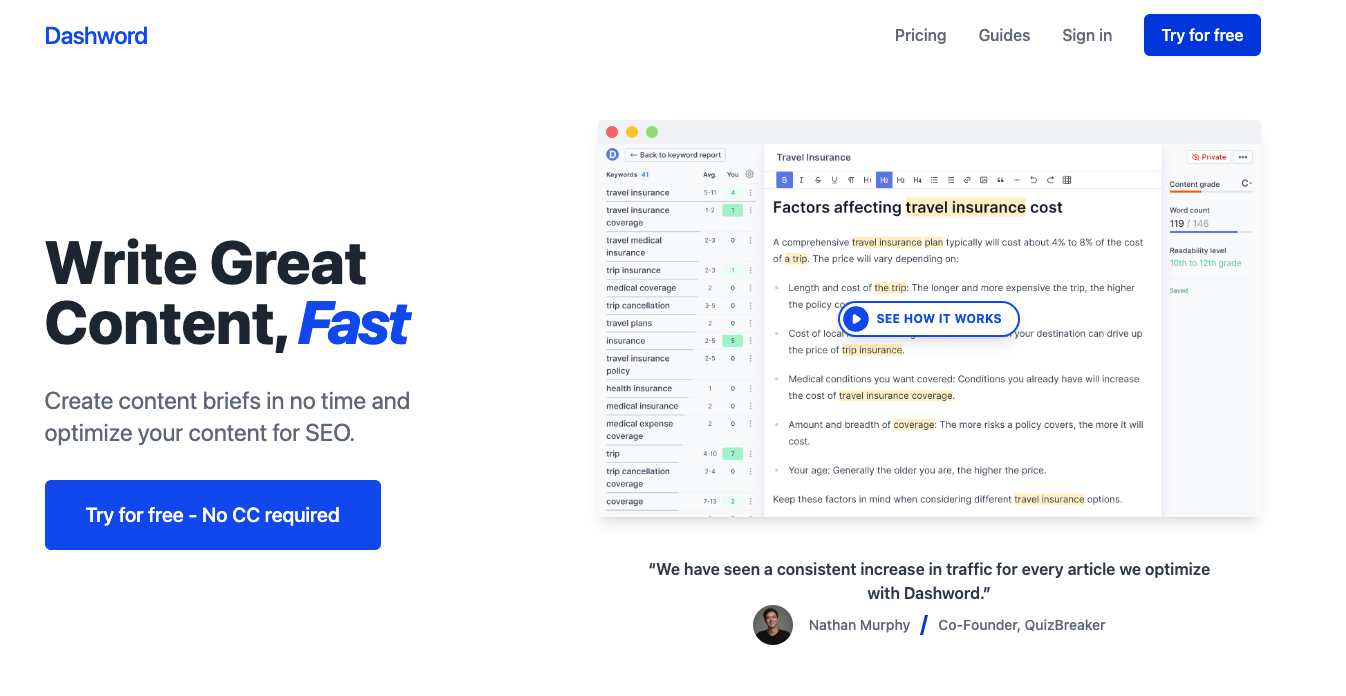
Dashword: What It Does
- Content Brief Builder: Helps create detailed briefs with keyword research, competitor analysis, and content structure suggestions.
- Content Optimization: Provides real-time feedback and scoring based on SEO best practices.
- Content Monitoring: Tracks content performance, identifies underperforming pages, and suggests updates.
Key Features of Dashword
- Competitor Content Analysis: Extracts outlines and key topics from competitor articles for inspiration and strategic content planning.
- Interactive Content Brief Builder: Facilitates collaborative brief creation with an easy-to-use interface.
- Real-Time SEO Feedback: Scores content based on keyword usage, readability, and other SEO factors.
- Automated Content Monitoring: Tracks keyword rankings, traffic trends, and alerts users to content requiring updates.
Who is Dashword For?
Content marketing teams looking to streamline their content creation process.
Businesses wanting to improve the quality and SEO performance of their content.
Agencies managing content creation for multiple clients.
Pros of Dashword
- Content Quality Focus: Emphasizes creating high-quality, well-researched content.
- Collaborative Brief Creation: Facilitates seamless teamwork on content strategy and development.
- Data-Driven Optimization: Provides clear, actionable insights to improve content performance.
- Time-Saving Automation: Automates content monitoring and reporting, freeing up time for strategic tasks.
Cons of Dashword
- Less Comprehensive SEO Features: Lacks some of the all-in-one capabilities offered by Seorocket, such as keyword research and automated publishing.
- Content Optimization Limited to On-Page Factors: Doesn’t offer tools for off-page SEO optimization like link building.
- Pricing May Be Prohibitive for Small Businesses: The Business plan, which includes content monitoring and more extensive features, might be costly for smaller companies or individual bloggers.
Streamlined content brief creation
Real-time SEO optimization feedback
Content performance monitoring and reporting
Collaborative features for teams
Not a full-fledged SEO suite
Focus primarily on on-page optimization
Pricing may be high for smaller businesses
Dashword Pricing
- Startup: $99/month
- Business: Custom pricing (starts at $349/month)
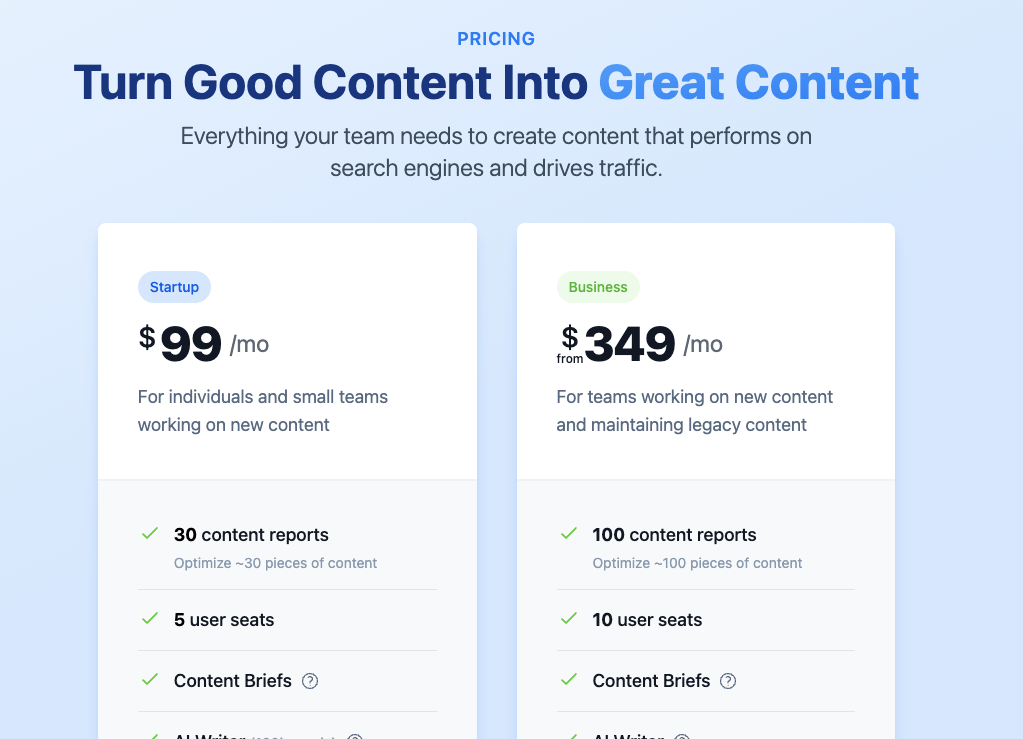
What Users Say About Dashword
Users praise Dashword for its ability to simplify content creation, improve content quality, and increase organic traffic. Many highlight the user-friendly interface and helpful content optimization suggestions.
What’s Missing in Dashword
Keyword Research Tools: Requires users to rely on external tools for comprehensive keyword research.
Content Generation Capabilities: Doesn’t offer AI-powered content writing features.
Limited Integrations: Could benefit from a wider range of integrations with popular marketing tools.
Final Thoughts on Dashword
Dashword shines as a powerful content marketing platform ideal for businesses prioritizing high-quality, SEO-optimized content. Its focus on streamlining the content creation process, providing data-driven optimization suggestions, and monitoring performance makes it a valuable asset for content-focused teams. However, companies seeking a complete SEO suite with keyword research, content generation, and a wider range of features may need to consider other platforms or supplement Dashword with additional tools.
Topic
Topic specializes in optimizing content for search engines by providing in-depth research, competitive analysis, and AI-powered content grading. It focuses on helping you create content that ranks higher by aligning with what your target audience is searching for.
Topic: Overview
Topic is a content optimization platform that leverages AI and natural language processing to analyze search engine results pages (SERPs) and provide data-driven insights to improve content relevance and ranking potential.
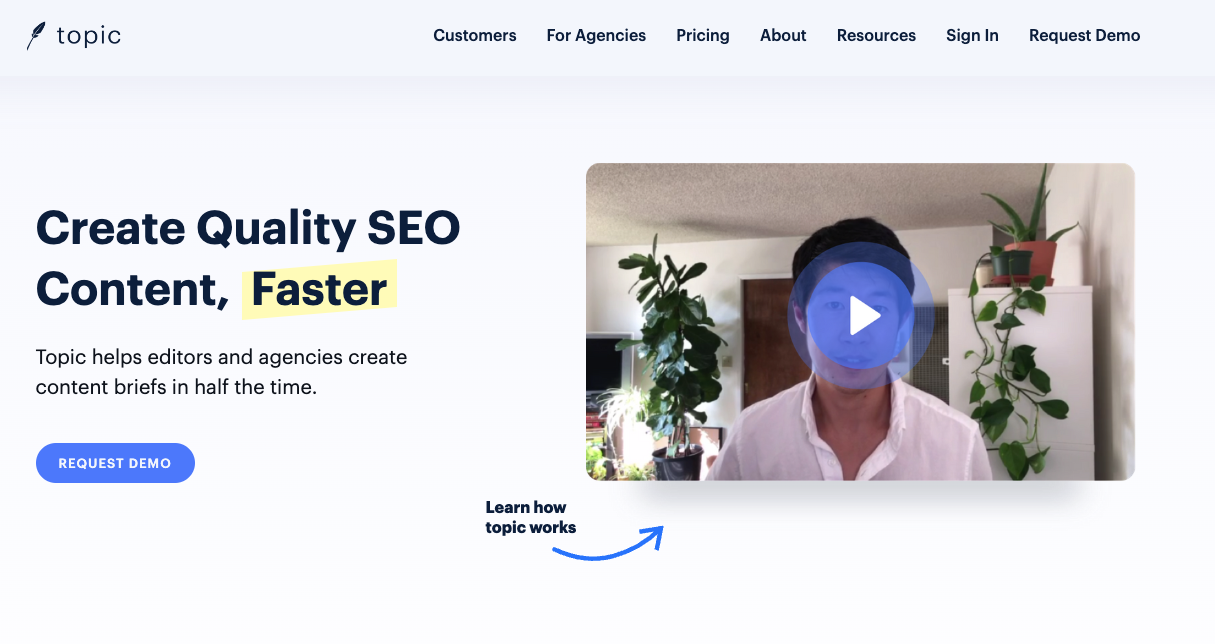
Topic: What It Does
- Analyzing top-ranking content: Identifies key themes, questions, and keywords used by competitors.
- Generating content briefs: Provides structured outlines with keyword suggestions and relevant topics to cover.
- Grading content quality: Analyzes drafts and existing content for SEO performance and suggests improvements.
- Offering AI-powered title and description suggestions: Helps craft compelling titles and descriptions that attract clicks.
Key Features of Topic
- Content Brief Generator: Creates detailed outlines with keyword research, competitor analysis, and topic suggestions.
- Content Grader: Provides real-time feedback on content relevance, SEO optimization, and overall quality.
- SERP Analysis: Analyzes top-ranking pages for your target keywords to identify ranking factors and content gaps.
- AI Title & Description Generator: Suggests engaging titles and descriptions to improve click-through rates.
Who is Topic For?
Content creators and copywriters looking to improve the SEO performance of their content.
SEO professionals seeking data-driven insights to optimize content strategy.
Businesses wanting to create high-quality content that ranks well in search results.
Marketing teams aiming to maximize content ROI and drive organic traffic.
Pros of Topic
- Data-Driven Content Optimization: Leverages SERP analysis to provide actionable insights.
- AI-Powered Content Grading: Streamlines the content review process and ensures SEO best practices are followed.
- Comprehensive Content Briefs: Provides a structured framework for writers to create optimized content.
- Integration with WordPress and Google Docs: Allows for seamless content creation and optimization workflow.
Cons of Topic
- Limited Functionality Beyond Content Optimization: Doesn’t offer keyword research or content generation features like Seorocket.ai
- Subscription-Based Pricing: Can become expensive for high-volume content creators.
- Focus on Written Content: May not be suitable for optimizing other content formats like videos or infographics.
In-depth SERP analysis and competitor research.
AI-powered content grading and improvement suggestions.
Detailed content briefs with keyword targeting.
Integrations with popular writing platforms.
Primarily focused on content optimization, not a complete SEO solution.
Subscription pricing model may not suit all budgets.
Limited to written content optimization.
Topic Pricing
- Starter: \$99/month
- Plus: \$199/month
- Premium: \$299/month
Topic offers three main pricing plans:
Each plan includes a different number of content briefs and optimizations per month.
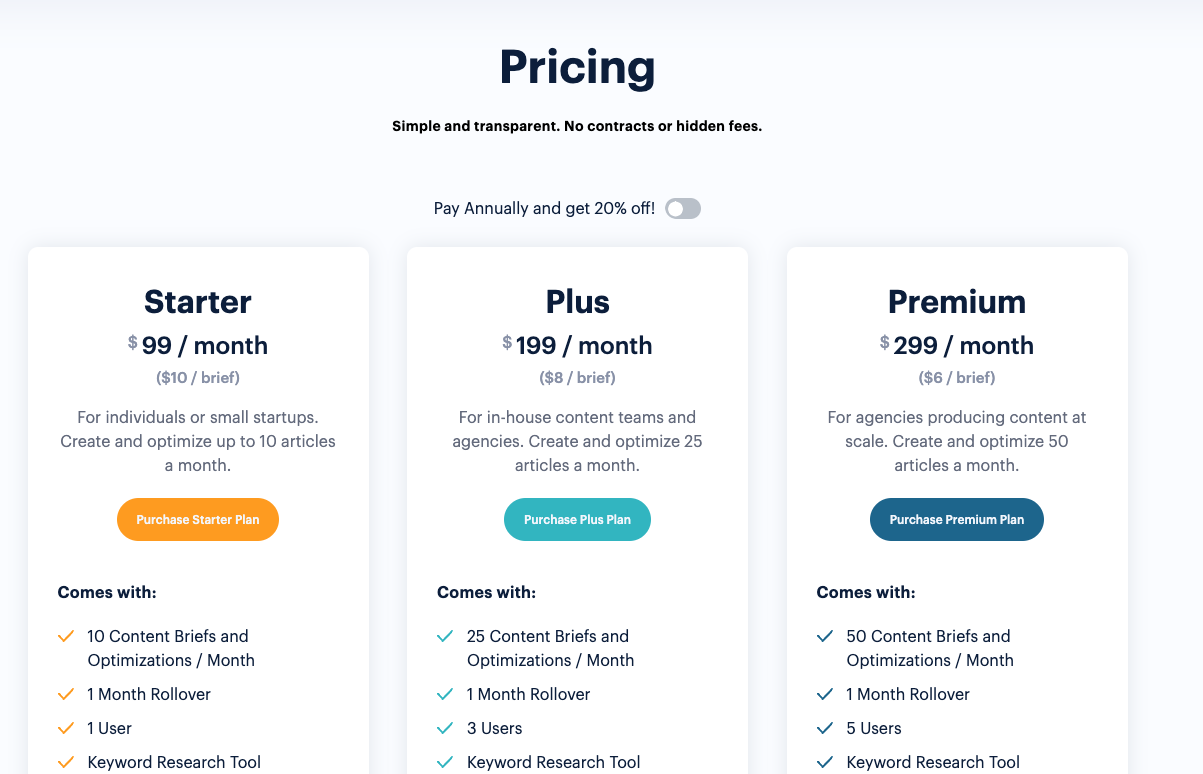
What Users Say About Topic
Topic receives positive reviews from users impressed by its ability to improve content ranking and organic traffic. Customers appreciate the detailed content briefs, real-time grading features, and user-friendly interface.
What’s Missing in Topic
Incorporating keyword research tools to provide a more holistic SEO solution.
Offering optimization features for other content formats like video and audio.
Providing more flexible pricing options, such as pay-per-use credits.
Final Thoughts on Topic
Topic excels at content optimization, offering data-driven insights and AI-powered tools to enhance the relevance and ranking potential of your content. Its focus on aligning content with search intent makes it an ideal choice for businesses and content creators looking to maximize organic traffic.
Dashword vs Topic: Which One Should You Choose?
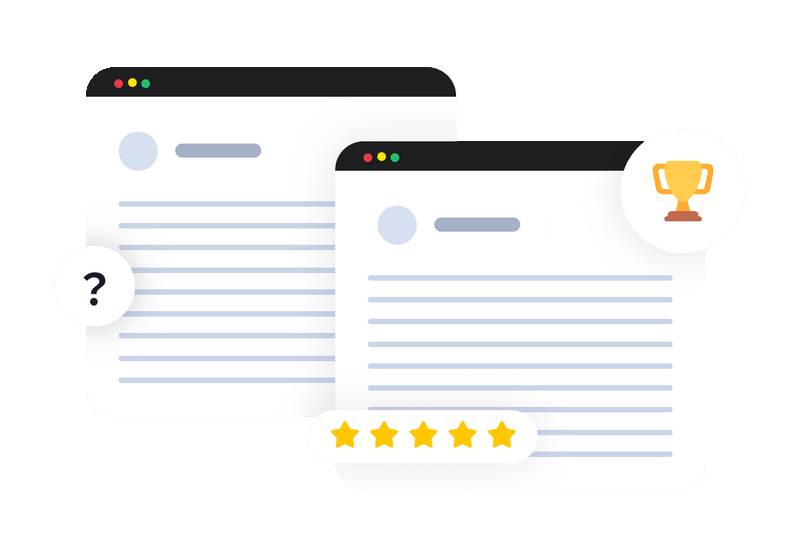
Choose Dashword If:
– You prioritize creating high-quality, well-researched content and want a platform dedicated to content optimization.
– You value collaborative features and need a tool that facilitates teamwork on content strategy and creation.
– You seek data-driven insights and actionable suggestions to improve your content’s SEO performance.
Choose Topic if:
– Your primary focus is optimizing existing content for better search engine rankings.
– You need in-depth SERP analysis and competitor research to inform your content strategy.
– You value AI-powered content grading and improvement suggestions.
– You want detailed content briefs to guide your writers in creating SEO-optimized content.
search engines ranking patterns to create content that dominates
searches, all without penalty risk.

Why Consider SEOrocket Over Dashword and Topic?
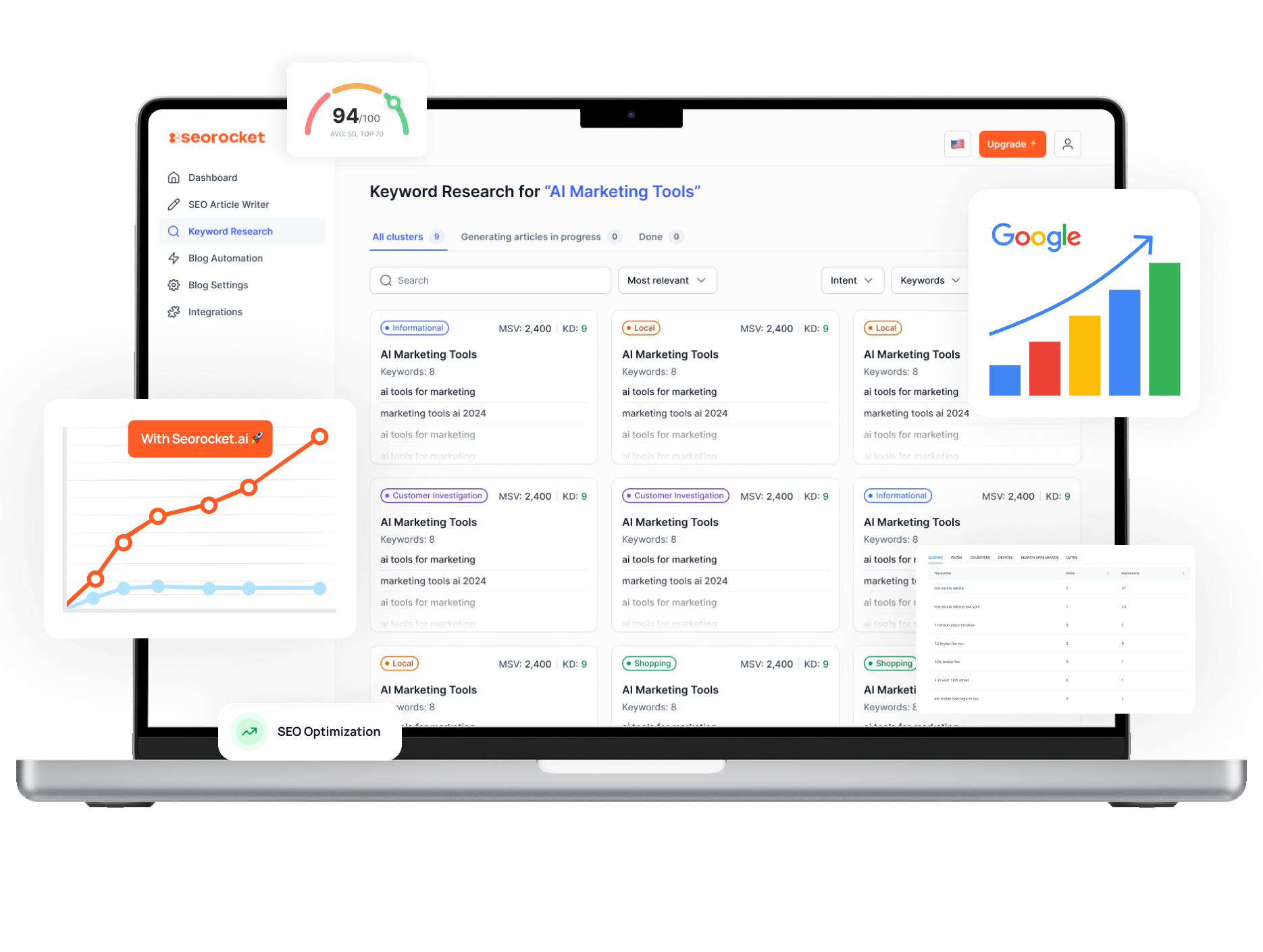
While Dashword and Topic AI are strong contenders in the content optimization and generation landscape, Seorocket stands out as a comprehensive and cost-effective alternative. Here’s why:
By choosing Seorocket, you can streamline your content marketing efforts, save time and resources, and achieve significant improvements in your search engine rankings.




